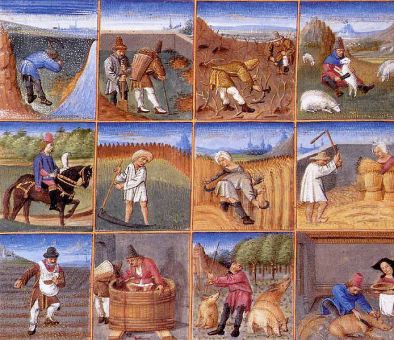
“Let me check my calendar and I’ll get back with you.” Coordinating calendars has become a regular routine for many, perhaps most, of us. We are scheduled people, busy people. Computers and phones buzz, beep, or ring reminding us of our schedule. They send texts and e-mails telling us where to go, when to be there, and what to do. For the most part things run fairly smoothly. We keep our appointments. We show up on time. Tasks are completed and crossed off the list.
Our schedules may be organized but what about our lives? What about that scattered, chaotic, restless feeling that comes from deep inside of us? No matter how well we stick to our schedule or how many tasks we accomplish, we often feel that there is or should be something more. In that moment the calendar is no longer an organized schedule but documentation of how crazy, disordered, and distracted our lives have become!
St. Augustine said that our hearts are restless until they rest in God. “Resting in God” sounds like a great idea but many think we are too busy to take time to rest in God. That’s often what our calendar tells us. So we live with the illusion of “As soon as.” As soon as the calendar opens up and I get some free time, then this restlessness will go away.” Sometimes we get even busier as a way to avoid the restlessness. My experience, however, is that the restlessness is not about the calendar but about God. That restless feeling is God calling us.
We may not have “resting in God” written on our calendar but the church does. It’s the Season after Pentecost. It is the longest season of the church year. The excitement of Easter is past and Christmas seems a long way off. The Sundays during this time all seem the same. The liturgical color stays green and not much changes. This is not a season of great feasts or fasts. It’s ordinary, every day life.
Week after week the season drags on with the same monotony as the hot, dry, sunny, Texas summer. Maybe that is the gift of this season. The routine and mundane invite us to look more deeply, to see beyond what we expect, and to discover that holiness is common and the common is holy. God is calling us to rest in God’s presence, to experience His love, to live and practice our Christian faith in the ordinary routine of every day life. It is a reminder of and a time to acknowledge and experience God’s presence and God’s faithfulness in the mundane day-to-day stuff of our lives. I sometimes think about it as “sacred monotony.”
Resting in God does not mean that we simply sit around and do nothing. It does not mean that we have to give up our daily schedule and tasks, though they might need to be adjusted or prioritized differently. Everything we do can be our prayer in the sense that what we do and who we are can connect us to the reality and presence of God.
Laundry, working, car-pooling, family obligations, cooking, shopping, paying the bills, home repairs, going to the doctor, running errands, vacation…. You know as well as I that the list goes on and on. Our calendar says look at all we have to do. The Church offers us the Season after Pentecost and says look at all the opportunities we have to practice resting in God.
Many of the things we have on our calendar and to-do lists are the result of existing relationships and prior blessings. So maybe we go through our day with thanksgiving – for the food we have to cook, the clothes we have to wash, the house we have to repair, the family we are feeding, the kids we are car-pooling, the body God has given us and the doctors who care for us, the study that challenges us, and the work that serves another. Our prayer and life become an expression of gratitude and thanksgiving.
This is the ancient practice of mindfulness. Ordinary life becomes our prayer. As we continue in the practice of mindfulness our focus shifts from the task to be completed to the underlying blessings and relationships and we find ourselves resting in God.
Thomas Merton (New Seeds of Contemplation, 19) explained it like this:
The requirements of a work to be done can be understood as the will of God. If I am supposed to hoe a garden or make a table, then I will be obeying God if I am true to the task to be done. To do the work carefully and well, with love and respect for the nature of my task and with due attention to its purpose, is to unite myself with God’s will in my work.

Leave a reply to Barbara Cancel reply